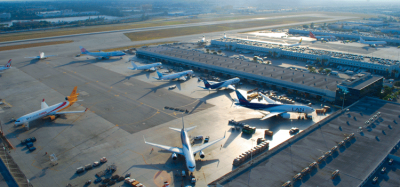Adjusting to change…
- Like
- Digg
- Del
- Tumblr
- VKontakte
- Buffer
- Love This
- Odnoklassniki
- Meneame
- Blogger
- Amazon
- Yahoo Mail
- Gmail
- AOL
- Newsvine
- HackerNews
- Evernote
- MySpace
- Mail.ru
- Viadeo
- Line
- Comments
- Yummly
- SMS
- Viber
- Telegram
- Subscribe
- Skype
- Facebook Messenger
- Kakao
- LiveJournal
- Yammer
- Edgar
- Fintel
- Mix
- Instapaper
- Copy Link
Posted: 22 February 2010 | Thomas J. Kinton Jr., CEO and Executive Director, Massachusetts Port Authority | No comments yet
The so-called “Great Recession” of the past two years has been one of the most challenging periods in the history of North American aviation. At Boston Logan International Airport, for example, traffic has fallen off by nearly two million passengers (from an all-time high of 28.1 million) since the economic downturn began in December 2007.
The so-called “Great Recession” of the past two years has been one of the most challenging periods in the history of North American aviation. At Boston Logan International Airport, for example, traffic has fallen off by nearly two million passengers (from an all-time high of 28.1 million) since the economic downturn began in December 2007.
Yet, if there has been one constant during my nearly 40 years in the airport business, it’s that whenever the airlines have been confronted by a crisis they’ve always found a way to successfully respond. Whether it was during the oil embargo at the beginning of the 1970s or the deregulation realignments at decade’s end, the PATCO air traffic controller strike to start the 1980s followed by Gulf Wars I and II, the SARS and bird flu scares and finally the attacks of September 11 that produced a revolution in airport security.
US carriers are likely to finish out 2009 with 8% fewer passengers than in 2008, but even in this most recent stretch of stormy economic weather we are beginning to see breaks in the clouds. This past July, traffic at Logan increased for the first time in more than a year and a half. The increase was slight but the positive numbers continued into the autumn, as passenger traffic was up more than 6% in September and November, thanks in a large part to the arrival of the four new low-cost carriers that opened for business in Boston in 2009, unprecedented for a single year.
Boston has competitive advantages: no airline here owns more than 25% of the market; education, health care, biotech and financial services are leading industries here and somewhat recession proof; and the average household income is among the highest in the nation. But Boston Logan is not the only market that seems to be turning the corner. Across America, the Federal Aviation Administration (FAA) predicts that, beginning next year, the number of people travelling by air will increase by an average of 2.7% per year over the next 16 years. By 2021, the FAA estimates that US carriers will be flying more than one billion passengers a year.
Time and again the aviation industry has been able to stay in the air by adjusting to changing conditions on the ground. The airlines are succeeding because they are not responding to downturns in the same old ways by leaning on traditional safety nets that are no longer there, such as using the front of the plane to make up for declines in business elsewhere.
Instead, the airlines are reconciled to the fact that the premium, last minute business traveller has become as cost-conscious as everyone else. That has blurred the lines that once separated the legacy and low cost carriers, as the entire industry now aggressively competes for the business traveller dollar. What that means in practice is that the low cost carriers are now migrating to the larger airports like Boston Logan, instead of serving major markets exclusively through secondary airports as they have always done in the past.
Further evidence of this change are the mergers and code-share alliances being consummated, unlike any we’ve seen before, as carriers get creative about maximising their leverage.
The new code share agreement between Lufthansa and JetBlue, for example, was a significant industry development since it marked the first time an international carrier had teamed with a domestic airline that did not offer passengers a first class cabin.
Besides the ingenuity of the airlines themselves, another important reason for the airline industry’s ability to bounce back is that air travel has become as integral to our way of life as the credit markets that build our homes and cities, or the electric grids that power them. Our globalised economy is inconceivable without an airline industry that can bring the world together quickly and safely, for both business travellers closing deals and everyday families looking for reliable and affordable air travel.

















